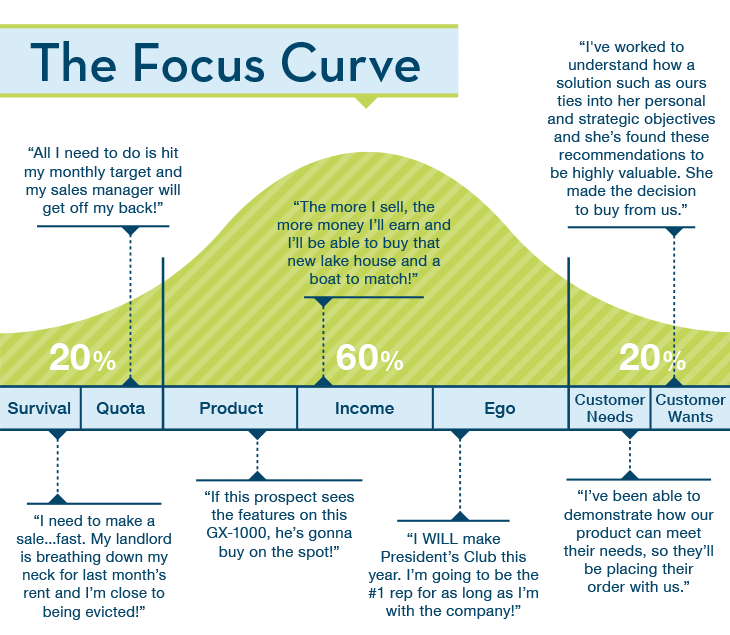Where Do Your Salespeople Focus Their Time?
The bottom 20% of sales reps focus on themselves, their own survival, or just having a quota of phone calls, hours in the office or other short-term measurement. The bottom 20% have a focus on themselves that says, “I don’t know if I can do this,” or “sales isn’t right for me” (survival), or “If I just make enough calls,” or “If I can do enough to get by (quota), I’ll be fine.” The middle 60% of salespeople have a focus that dictates that they pay most attention to their product, personal income or their own ego. The top 20%, however, have a very different sales focus. It’s all about the prospect or customer. The top 15% focus on what their prospects Need, while the top 5% focus on what their prospects really Want. They’re all about satisfying needs in the way that their prospects want to see them satisfied. Their focus is very different. Check out our infographic below. Be honest with yourself. Where does your team fall on the curve?

The Sales Focus Curve Explained
Your salespeople can have 6 potential areas of sales focus in their day-to-day sales activities:
- Survival – exactly what it sounds like….trying to make this month’s bills. Trying not to be fired. Straight commission comp plans typically generate this mindset.
- Quota – a focus on doing the bare minimum…number of calls, number of contacts, and – here’s a key point – avoiding negative attention.
- Product – this sales focus is typical of a sales rep who has a love affair with the features of product he or she sells. They figure that if they show people just how “cool” their product is, they’ll buy.
- Income – while research shows top salespeople are highly driven by money, note that the ones who focus only on income are average. They’re right in the middle. Money-motivation is good (we know this from our assessment work)….it’s just not the end-all, be-all.
- Ego – the desire to be seen as #1 drives this focus area. This focus gets a salesperson closer to the top 20%.
- Prospect Needs – needs are below the surface and a focus on this area can help a salesperson uncover a deeper motivation to buy.
- Prospect Wants – salespeople who focus on wants are able to get to much deeper, more personal buying motives with their questioning strategy. They gain an understanding of their prospect’s needs, and position their offerings to satisfy the prospect’s wants.
Having mastery of a non-manipulative, linked, sequential and customer-focused sales process is the first step to moving sales reps to the top of the Sales Focus Curve. The cornerstone of our offerings is such a sales process and we teach it in a way that guarantees there’s long-term cultural change inside of your organization.
NOTE: Our sales training tools are designed to make your life easier. Use them to your advantage.
Create the Biggest Impact at Your Annual Sales Meeting
It’s not often that you’re able to get the whole sales team together. Make the most of your meeting by getting hyper-focused on the things that will improve your team’s performance the most.



